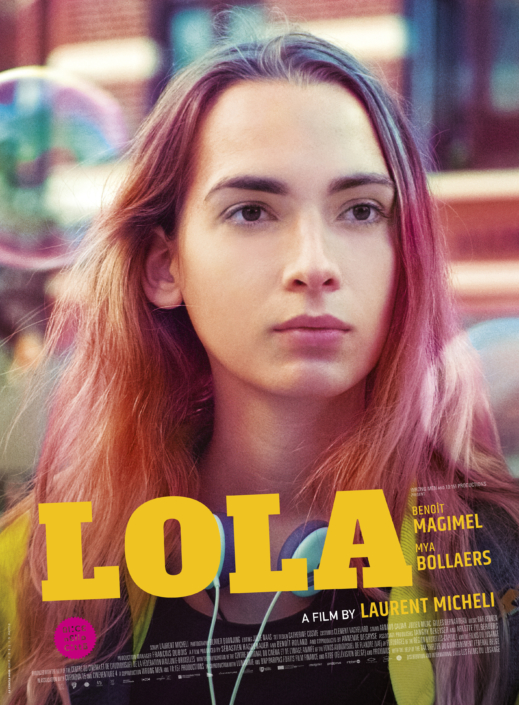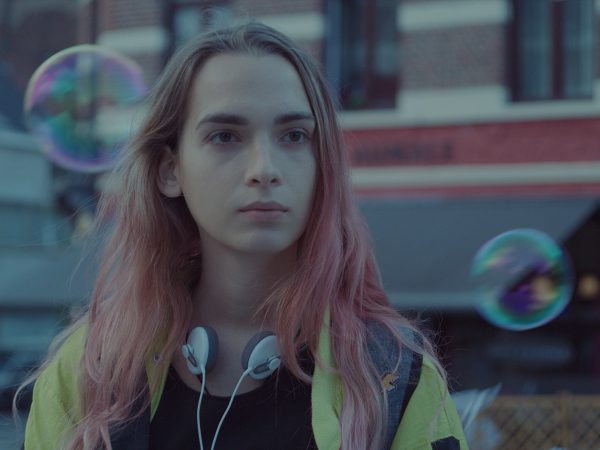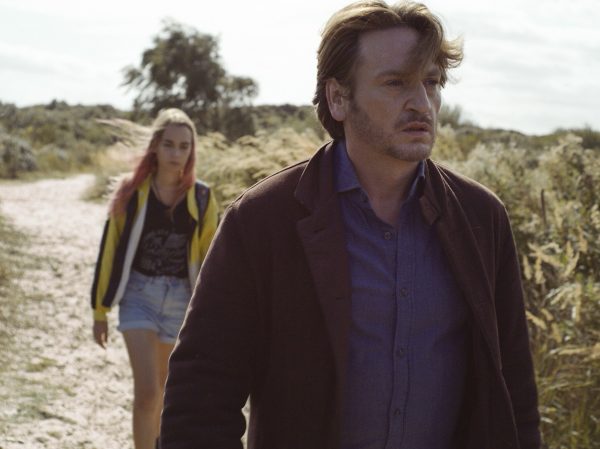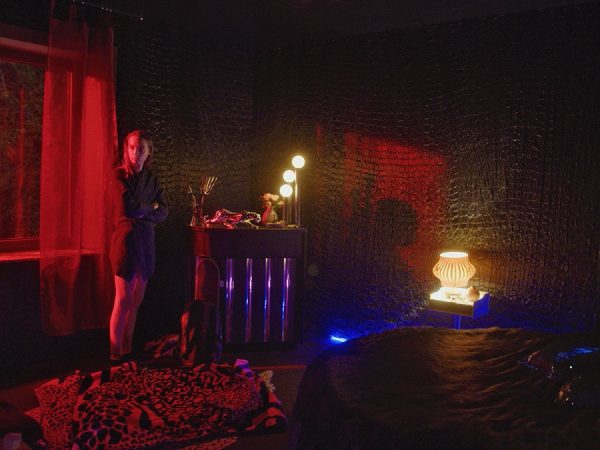
“Lola” (“Lola vers la mer”) (2019 production, 2020 release). Cast: Mya Bollaers, Benoît Magimel, Sami Outalbali, Jérémy Zagba, Els Deceukelier, Anemone Valcke, Delphine Bibet, Kris Swinnen, Thao Maerten. Director: Laurent Micheli. Screenplay: Laurent Micheli. Web site. Trailer.
When life doesn’t pan out as we hoped and believed it would, it can be disillusioning, if not devastating. It can even lead to tremendous strain among those who thought they could count on one another when it came to living up to expectations. Such exchanges can turn into seemingly irreparable estrangements filled with bitterness and no hope of reconciliation. But need that be the case? Isn’t it possible that the damage can be undone and that harmonious relations can be re-established? It all depends on what we believe is possible, as seen in the French-Belgian LGBTQ+ domestic drama, “Lola” (“Lola vers la mer”).
Eighteen-year-old Lola (Mya Bollaers) has been going through the process of transitioning from male to female for the past two years with the support of her mother, Catherine. She’s been fortunate to have that backing, too, given that her close-minded father, Philippe (Benoît Magimel), refused to recognize or accept this development, choosing to continue to view Lola as Lionel, the male child to which his wife gave birth years before. And ever since “Lionel” went ahead and made that allegedly foolhardy, exceedingly embarrassing decision (at least in Philippe’s view), Lola and her father have been estranged from one another. Catherine, meanwhile, continued to assist her transitioning daughter throughout that entire time, providing financial support and accompanying her to medical appointments.
During that time, Lola had been growing accustomed to living as a woman in terms of her appearance, sensibilities and outlook. And, having gone through that, she’s now ready to complete the process with gender reassignment surgery. But, just as she’s on the brink of having the procedure, Catherine passes away, leaving Lola on her own. She moves into a home for similarly situated LGBTQ+ youth, hoping that she can still carry through on her plans. However, before doing so, she wants to achieve closure by saying goodbye to her late mother – a gesture Philippe is determined to prevent.
When Lola seeks to attend what she believes is supposed to be her mother’s funeral, she discovers that the ceremony has already been held. Philippe’s plan to intentionally exclude her from it has succeeded, and she’s positively livid. But, even when she assumes things are all over, she learns that they’re not – that there’s one final act to be performed.
Lola discovers that Catherine’s last wish was to have her ashes scattered at her childhood home along the Belgian North Sea coast. Philippe has made plans to carry out the deed by himself, but Lola insists on accompanying him, forcing herself on her father as an embittered but willful traveling companion. She knows it will be a tension-filled journey, but she doesn’t care. Lola feels the need to be part of this pilgrimage and asserts her resolve to make it happen.
Thus begins an unconventional road trip movie. While elements typical of this formula are certainly present here – the disagreeable duo, the outrageous incidents, the influence of unexpected outsiders (in this case of both a real and surreal nature) – given the polarized yet also familiar qualities that both separate and bind them, Lola and Philippe make for a decidedly unusual pair of highway comrades. They both spew more than their share of venom toward one another. They each engage in over-the-top behavior. They collectively aren’t above making scenes in public when events become particularly overheated. And, given that many of these events occur in close quarters, like the confines of Philippe’s car, there’s a decidedly uneasy, claustrophobic feel to developments as they play out.

At the same time, however, there are moments when hints at reconciliation surface. Given that Lola and Philippe share the same degree of fervor for carrying out this reverential task, they both want to honor Catherine properly despite their anger toward each other, a mutually held quality that deep down can’t help but nudge them into going about this endeavor in a civil and dignified manner. There may even be hope for something more, like an amicable resolution or reunification. But, for that to happen, there’s much that they need to get past.
That’s not to say this can’t happen. Indeed, there are guides who interact with them along the way who provide insights that might help make these outcomes possible. This is perhaps best seen at an unplanned late night stop at a gentlemen’s club/guesthouse run by a wily, no-nonsense owner (Els Deceukelier) who doesn’t hesitate to call things as she sees them, especially where Philippe is concerned. Empowerment advice is also doled out by one of the pole dancing performers, Kaatje (Anemone Valcke), who joyfully and playfully asserts that we should all be happy with who we are, guidance that’s undoubtedly encouraging for Lola in light of all the scorn she’s faced from Philippe and so many others during her transition.
But, even as circumstances evolve, there’s still the difficult task that Lola and Philippe face at the end of their journey, a destination that raises old issues for both of them. This includes flashbacks to Lola’s youth as Lionel (Thao Maerten), showing that the hurts s/he experienced are older than what has arisen in the recent past. The implications of these revelations are almost as staggering as those that emerged throughout the duo’s journey to the seacoast and in the two years that preceded it. There’s much on the line for both Lola and Philippe with regard to what lies ahead – and what form it will take.

As this story opens, the walls built up between Lola and Philippe are quite formidable. Neither is willing to budge an inch, and they see no possibility for that to change, despite their common goal of wanting to participate in the dispersal of their loved one’s ashes. One might think that such common ground would help facilitate a resolution, but, as they begin their journey together, no possibility of that seems likely. That’s because each of them has become so entrenched in their hatred for one another that their beliefs are virtually intractable. And that’s important to bear in mind, given that our beliefs govern the nature of our existence thanks to the conscious creation process, the philosophy that makes such manifestations possible.
The walls between Lola and Philippe are initially solidly reinforced by the power behind those beliefs. They’re so unshakable, in fact, that they make those enclosures surrounding Jericho look like picket fences. But, because beliefs are alterable and because they have the potential to make an infinite number of probabilities possible, there’s no telling what can happen if those notions begin to shift in the consciousness of father and/or daughter. Indeed, breaking through limitations (or, in this case, more precisely, barriers) in our beliefs can help anyone realize changes in the outcomes and realities they experience. So why should it be any different for Lola and Philippe?
Expecting such sweeping change to materialize instantaneously is probably unrealistic, despite the kinds of miraculous results that are often depicted in Hollywood movies with supernatural themes. The process tends to be gradual, one that evolves over time, usually as a result of the unfolding of new understandings of how the prevailing conditions at the outset managed to come into existence in the first place.
Journeys like the one Lola and Philippe embark upon frequently provide opportunities for reflection, assessment and dialogue in connection with such matters. Their travels give them the time, space and solitude to examine the existing conditions and to tune out the distractions that might interfere with getting a better handle on the beliefs driving one another’s interpretations of reality. Again, change may come slowly, but the evolutionary process that begins through ventures like this could prove revelatory, eye-opening and even earth-shattering. And, if something valuable and meaningful could come out of it – especially when mutual interests are involved – why not give it a chance?

A large part of this process involves wrestling with preconceived notions and beliefs. For example, when Philippe considers Lola’s decision to transition, he has difficulty getting past an idea that he sees as untenable, perverse and unnatural. He’s also upset at how that decision will impact the ways others see him as a father and as a person. But, perhaps most of all, he’s hurt over the loss of a son whom he had hoped to raise to adulthood, a blow to his own perception of himself as a dad. And in none of this does he consider the reasons why Lola has chosen to pursue the course she’s on to become the person she knows she need to be.
At the same time, Lola gives little consideration to how her decision affects Philippe. She doesn’t appear to take account of his feelings and what impact her actions will have on them. This is not to suggest that she’s being selfish; she has every right to become her true, realized self. But, if she expects Philippe to respect her wishes, shouldn’t she be willing to do the same when it comes to making an effort to understand her father’s feelings?
With both Lola and Philippe having been blind to these concerns before beginning their odyssey together, it’s not surprising that they were unable to appreciate and understand one another. Consequently, if they ever hope to repair the gaping rift between them, they at least have to begin at a point where they’re amenable to trying to grasp where each of them is coming from, and that starts with attempting to recognize and fathom their respective beliefs. Doing so increases the potential for opening doors to understanding – and the possibility of moving their relationship in a healthier new direction.
If conscious creation makes virtually any scenario possible, one might legitimately wonder why anyone would purposely manifest a situation as toxic as this. That’s an argument with genuine merit, but it also introduces an intriguing possibility. Circumstances like this, as difficult and challenging as they may be, afford opportunities for learning valuable life lessons. If the purpose of our soul’s existence, growth, development and evolution is to experience a range of scenarios, all of which intrinsically have their own validity, that would include situations like this. That’s true not only for what it’s like to go through them, but also to see what comes out of them, including both positive and negative results.

As noted above, it’s not as if Lola and Philippe aren’t without help in this venture. The gentlemen’s club manager and pole dancer, for instance, each step in to offer guidance intended to aid the process as it unfolds. Catherine’s intangible presence is also in place, not just in terms of the task she sets forth for her daughter and husband, but also in more subtle ways, such as during times of particularly combative crisis. Such divine intervention helps to smooth out these argumentative incidents, providing a gentle, loving touch to point things in a better direction. It helps to remind Lola and Philippe of why they’re on this journey to begin with, both in terms of its ritualistic resolution and the hoped-for reconciliation between them.
As with many road trip tales, the characters in these stories often end up becoming very different people by journey’s end. The developments that occur during these odysseys frequently help to forge new relationships and to enable individuals to transform themselves and become the people they were genuinely meant to be. Such possibilities as forgiveness and reconciliation, for instance, are indeed possible. But no one will ever see such results if they never make the effort to find out, and it always begins with examining and assessing our beliefs and those of others. As contentious as this duo’s relationship may be at the outset, there could be much in store if they pursue this path and make the most of the opportunity. We can only hope they do so.
Significant and dramatic life events often make for strange affiliations. So it is in this intensely moving, often-outrageous road trip story of a pre-op transsexual and her estranged father. Their stormy journey is replete with a series of arguments, revelations, flashbacks and attempts at reconciliation, along with a touch of the surreal and subtle hints of otherworldly intervention. Some elements of the story are admittedly predictable, and portions of the second act tend to lag a bit at times, but director Laurent Micheli’s second feature offering also takes some unexpected and deliciously intriguing twists and turns in getting viewers to the film’s destination. Punctuated by a crisp screenplay loaded with biting, no-holds-barred dialogue, incisive insights, and more than a few genuinely heartfelt moments, as well as the superb debut performance by transgender actress Mya Bollaers, this touching Belgian/French co-production is a delightful, affecting watch that, while not wholly original, nevertheless comes across as a warm, feel-good story without ever becoming schmaltzy, manipulative or saccharinely sentimental. Bravo, “Lola”!
Viewers in Europe and Canada will be pleased to learn that this offering is widely available for streaming in those countries. In the US, however, the film has no general distributor, regrettably making it somewhat harder to come by. It has been playing at film festivals (especially LGBTQ+ events) stateside, but it has yet to secure mainstream theatrical or streaming agreements. That’s unfortunate, especially at a time like Pride month. Nevertheless, interested domestic viewers who have an opportunity to screen this release should avail themselves of it.
Bridging gaps may be far from an easy process, one for which there’s no guarantee of success. Yet consider what’s to be gained by attempting to do so rather than just leaving things as they are. Unimagined benefits can come from such efforts in areas like healing, well-being and meaningful personal growth, none of which may materialize without the attempt at trying. Lola and Philippe could learn a lot from such an undertaking. And so could many of us.
Copyright © 2021-2022, by Brent Marchant. All rights reserved.

No comments:
Post a Comment